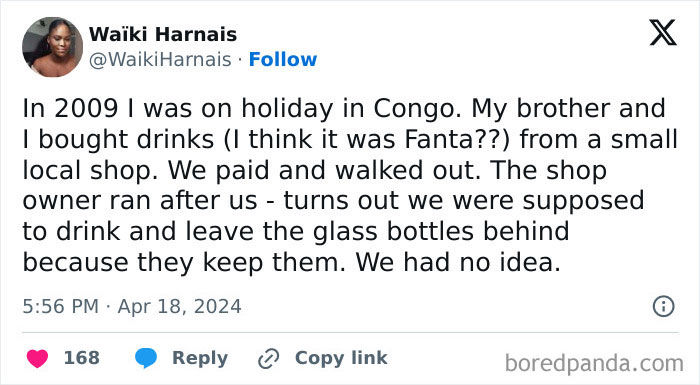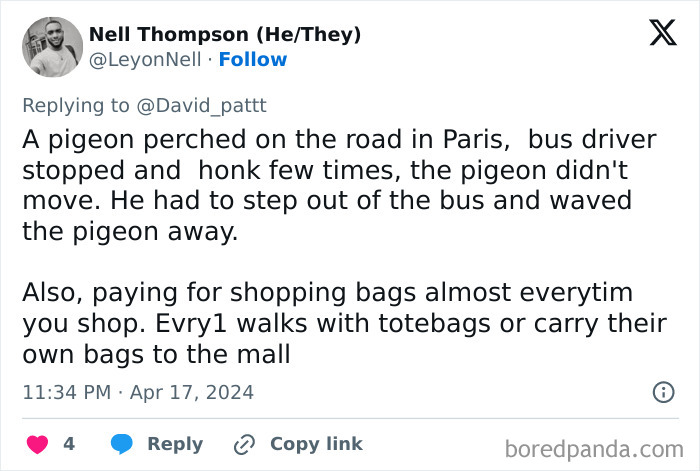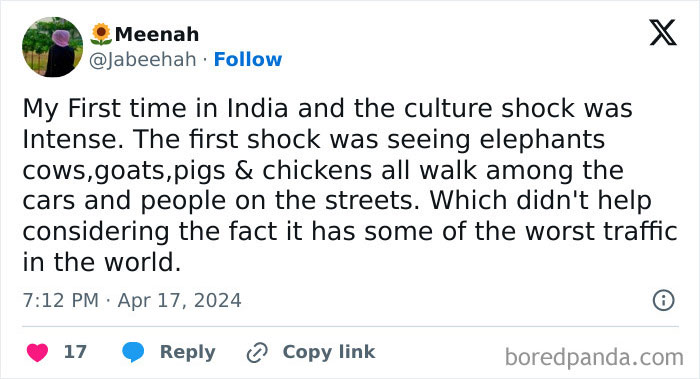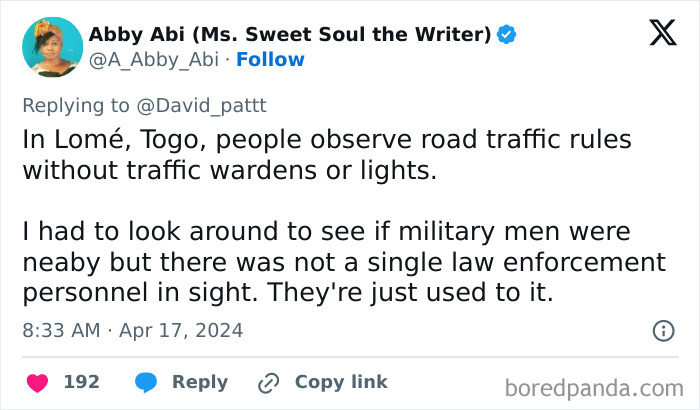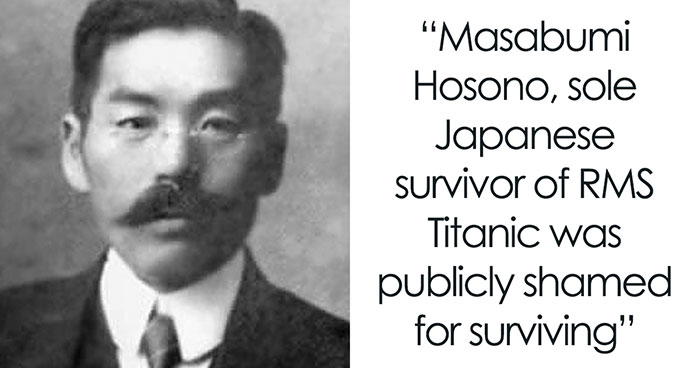Travel enthusiasts would likely agree that one of the most interesting parts of traveling is getting acquainted with different cultures; and there sure are plenty of different ones. Boasting various unique customs, authentic languages and food traditions, among other things, some might be closer to what you’re used to, while getting acquainted with others might feel like stepping into a completely different world.
The latter is what netizens on X (formerly Twitter) have discussed when one user asked them about the biggest culture shocks they’ve ever witnessed. Quite a few people shared stories of what surprised them the most while immersed in one culture or another, ranging from food to language, to recycling and transportation-related matters.
Curious to see what other culture shocks they’ve experienced? Wait no longer and scroll down to find their thoughts on the list below, where you will also find Bored Panda’s interview with Professor at the Department of Geography and Environmental Studies at Wilfrid Laurier University in Waterloo, Canada, Sean Doherty, who was kind enough to share his thoughts on culture shock.
This post may include affiliate links.
Netizen’s answers in the X thread covered nearly anything and everything there is, which is not surprising bearing in mind how different even the most mundane of things can be in different places.
Take food, for instance; something that’s a necessity for everyone in the world can differ quite drastically from country to country. (Even though some cuisines, such as Italian or Chinese, seem to be quite popular outside of the two countries as well.)
While food is a necessity in order for us to survive, it is much more than that, especially in the context of culture. A study delving deeper into the links between food and culture, as well as religion and traditions, emphasized that learning more about food by asking questions such as how something is made, what ingredients are used, and why the dish is called a certain way can help people understand the culture and its approach to life better.
“In the end, we can say that food functions symbolically as a communicative practice by which we create, manage and share meanings with others,” the study read in part.
While different eating habits can be a common cause for culture shock, many people seem to be intrigued by or interested in acquainting themselves with new flavors; if not abroad, then in their home country, at least. Studies suggest the popularity of ethnic foods in the US has been on the rise, arguably meaning that more and more people are open to trying out something not that customary to their area.
My wife and I went to Belize earlier this year. Beer (and maybe soft drinks also) came in glass bottles. You paid a deposit when you bought it, and got the deposit back when you returned the bottle. The bottles are returned to the bottling plant, where they are washed and re-used. That practice was common in the US decades ago.
According to Dr. Sean Doherty, another common—likely the biggest and the most immediate one, too—cause for culture shock is an unfamiliar way of speaking, be it a different language or even an accent. “It can be so difficult to perform even simple tasks, such as acquiring transport or booking a hotel, when you cannot communicate effectively. After that, trying to fit in and engage with locals is very difficult if there is a language barrier. I’ve had many culturally isolating experiences result from not understanding what is being said, or being able to share with locals,” he told Bored Panda.
NZ police only carry pepper spray and batons. They have tasers in a locked box in the car. I remember when a guy was threatening me with a machete on the street three police cars screamed up and three officers jumped out of each car with their their batons at the ready. They seemed a little disappointed I'd already talked the guy into sitting in his car and waiting for the police to arrive.
Elephants is a bit of a stretch. Everything else wanders wherever they want. You’ll have to watch out for cows wherever you go
“Other reasons for culture shock that I have experienced stemmed from attire, infrastructure, and transport differences,” Dr. Doherty continued. “We may look around and see unfamiliar attire and feel like we stand out or don’t fit in. We may end up in a city or town with buildings and roads laid out much differently than our home towns which can be disconcerting. The way people move about can also be dramatically different, with more people walking, cycling or using transit; all this can be a shock at first. Embracing these differences, or at least tolerating them, I think would reduce the culture shock.”
Be it food, socializing, traffic rules or other aspects of living in—or even traveling in—a certain country that evokes it, culture shock can take some time adjusting to. Gitnux revealed that among overseas workers, for instance, roughly one-in-six need a year to adapt to the new work culture.
Gitnux also pointed out that quite a few people are likely to feel reverse culture shock, which stems from coming back to the country of origin after some time abroad. Statistics show that as much as 15% of foreign women in Japan feel said shock upon going back to their homelands.
People jump from moving buses and trains in several African countries...
Even though culture shock typically takes some time to get adjusted to, it is a completely natural part of immersing yourself in an unfamiliar environment, be it traveling in or moving to an unfamiliar place.
For Prof. Doherty, immersing yourself in different cultures and environments is one of the most important things to do in order to have a fulfilling experience whilst a visitor. “I try to seek these experiences out, be it traveling to markets and residential areas where the locals actually live, or seeking out natural or built environments different than back home. Sticking to tourist areas, or all-inclusive resorts, has limited appeal to me. But it can be challenging to identify these areas, stay safe, and not fall for tourist traps. Having a local friend, relative or guide is invaluable for this.”
In the UK Lunch is referred to as 'dinner', except when it is referred to as 'Lunch', or 'luncheon'. Dinner is referred to as 'Tea', except when it is referred to as 'supper', or when it is called 'Dinner'. 'Tea', is dinner, except when it is drunk. Or when it is in the afternoon or cream (then it's scones, finger sandwiches, and cake). Sometimes Tea will be high, then it is is sandwiches, cold meats and scones.
“To me, it’s the new experiences, interactions, and conversations,” Dr. Doherty continued. “I love trying local foods, especially seeing how they are grown or prepared. New sites and natural areas can be exhilarating. Talking with locals about their experiences and lives, and sharing your own, can be uplifting and insightful. All this can dramatically change your own perspective and life when you’re back home, and build confidence to explore even further.”
In Greece we go to the supermarket in sweats or leggings, but when we go shopping or for coffee we're dressed casually/relaxed but not overdressed. At least me and my friends.
But for those who find it overwhelming, there are some ways to cope with it, such as spending time with someone who can explain certain customs or help with learning the language, connecting with other foreigners in the country or with things you find familiar and comforting (such as your local foods, activities, or rituals). Finding a hobby that can help relieve stress is also likely to help.
I'm assuming you meant napkin, right? Fun fact, the word serviette in Greece means period pad
Research on culture shock’s impact on one’s psychological well-being suggested that action to minimize the detrimental effects can be taken even before coming into the new environment. The feelings of depression, anxiety and helplessness that often entail culture shock can be reduced by preparing for it - understanding the process of culture shock itself as well as the features of the new culture.
When in the new country already, working on self-confidence and optimism, accepting new cultures, and seeking social support are the three ways to overcome the psychological discomfort, if any.
The aforementioned research also suggested that sometimes the stress caused by culture shock can stimulate one’s passion for cultural learning, which can speed up people’s adaptation to new cultural circumstances. That’s why it might be beneficial to work on trying to minimize said stress rather than eliminating it altogether.
Exploring the diverse reactions people have when stepping into others' homes can provide valuable context on culture shock.
For more insights into how everyday environments influence our perceptions and experiences of unfamiliar cultures, you might find it helpful to read about some eye-opening experiences shared by visitors in unique domestic settings like this.
I spent a semester in NE India and had some pretty intense culture shock. Eating with my hands was interesting, but I sure as hell wasn't about to be the only one using a spoon. I visited a very remote village near the Myanmar border at one point, and they nervously asked me if I brought my own spoon because they didn't have any in the whole village. I went to use their outhouse, which was of course a squatty potty (totally normal there), but above it was a hen laying on eggs. I just didn't poop for a few days, I was so terrified to poop. I rode a bus back into town from that village and MAN they do not make bus seats for people over 6' tall. I went up top and rode on the roof with the luggage.
Naples. There are specific unwritten traffic rules that foreigners don't get immediately. They don't respect stops or priorities, it's just a rule of one after another (like in Canada for example), which isn't the European union rule. So even if you're supposed to pass, you don't because someone was waiting for longer time than you, and sometimes you're not supposed to pass but people stop to let you go. They also honk A LOT but it's mostly friendly or to warn you about a danger. When you get used to it it's lovely to drive there. Wonderful place and wonderful people too.
In Rome traffic lights are an indication, in Napoli they are decoration
Load More Replies...I spent a semester in NE India and had some pretty intense culture shock. Eating with my hands was interesting, but I sure as hell wasn't about to be the only one using a spoon. I visited a very remote village near the Myanmar border at one point, and they nervously asked me if I brought my own spoon because they didn't have any in the whole village. I went to use their outhouse, which was of course a squatty potty (totally normal there), but above it was a hen laying on eggs. I just didn't poop for a few days, I was so terrified to poop. I rode a bus back into town from that village and MAN they do not make bus seats for people over 6' tall. I went up top and rode on the roof with the luggage.
Naples. There are specific unwritten traffic rules that foreigners don't get immediately. They don't respect stops or priorities, it's just a rule of one after another (like in Canada for example), which isn't the European union rule. So even if you're supposed to pass, you don't because someone was waiting for longer time than you, and sometimes you're not supposed to pass but people stop to let you go. They also honk A LOT but it's mostly friendly or to warn you about a danger. When you get used to it it's lovely to drive there. Wonderful place and wonderful people too.
In Rome traffic lights are an indication, in Napoli they are decoration
Load More Replies...
 Dark Mode
Dark Mode 

 No fees, cancel anytime
No fees, cancel anytime 















